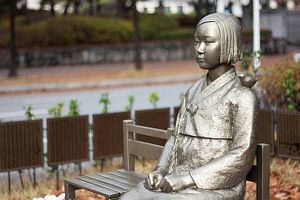The South Korean Task Force on Sex Slave Agreement announced on December 27 that the 2015 agreement concluded between South Korea and Japan was based on a unilateral decision by the former Park administration without proper participation from the Ministry of Foreign Affairs or the sex slave victims, often euphemistically referred to as “comfort women.”
The task force was established in July 2017 as an agency reporting directly to the Minister of Foreign Affairs to review the comfort women agreement, which was signed on December 28, 2015 between South Korea’s former President Park Geun-hye and Japanese Prime Minister Shinzo Abe, which promised the final closure of the sex slave question once and for all.
After five months of review, the task force announced that Park and the Blue House had taken over the negotiation process, which had been originally led by the Ministry of Foreign Affairs, to conclude the agreement in 2015.
Reportedly, the Ministry of Foreign Affairs was alienated from the negotiation after that point, while Park ordered the then-chief of the National Intelligence Service, Lee Byung-ki, to lead high-level discussions with Japan behind closed doors. Meanwhile, the Ministry of Foreign Affairs continued to hold bureau-level talks with Japan, as means to “conceal” the real talks being led by the NIS chief.
The task force also revealed secret agreements that had not been disclosed when the comfort women agreement was being announced to the public. One of them included occasions where the South Korean government secretly agreed to “resolve” the issue of installing comfort women statues, despite the administration’s public stance that they cannot be involved in dismantling the statues because “they were built by private organizations.”
Also, the task force argued that South Korea might have expedited the conclusion of the agreement due to pressure from the United States. Reportedly, the United States has indicated its “fatigue over history” when it came to the long-term question of cold relations between South Korea and Japan stemming from historical issues.
It is expected that all these revelations will spark further controversy and doubts about the comfort women agreement in South Korea.
The term “irreversible” that was used in the agreement also became subject to questioning. The term was first suggested by the South Korean government with the intent of expressing the will to “never withdraw from apology.” However, throughout the course of negotiations, the usage of the term has been distorted to emphasize instead the final conclusion of the comfort women question, spurring criticisms that South Korea was dragged into Japan’s intentions.
Moreover, the task force has reported that the 1 billion yen that Japan promised in the agreement to pay as reparations for sex slave victims was agreed upon without social consensus or the consent of the victims themselves.
The ruling Minjoo Party of Korea has welcomed the task force’s report, stating that the agreement was “poorly made and wrong.” The party has called for “cooperation throughout all parties to create an agreement that is acceptable by the public and the sex slave victims,” so that the agreement can bring “true cure and recovery to the victims.”
President Moon Jae-in also made a public statement admitting that “critical flaws were found in the sex slave negotiations between South Korea and Japan in 2015, both in procedure and content,” and has called on his government to come up with follow-up measures to deal with the issue.
Some interpret Moon’s statement as de facto initial steps to try to renegotiate the agreement with Japan, which was one of the pledges he made during his presidential candidacy.
The opposition Liberty Korea Party has strongly criticized the report, describing its announcement as a “bad move which not only fails to resolve the sex slave question, but also increases security risks.”
In particular, with the PyeongChang Olympic Games just around the corner, the party stated that the announcement comes at the “worst strategic time ever” and does not meet even the government’s own intent to invite the Abe administration to the Olympics.
Japanese Prime Minister Shinzo Abe has not made any official statement on the matter. However, Japanese Minister for Foreign Affairs Taro Kono stated on December 27 that South Korea-Japan relations will become impossible to manage if the South Korean government tries to “alter the agreement.”
Chief Cabinet Secretary Yoshihide Suga also said several times on January 4 that the agreement “will not move an inch,” and deplored South Korea for “moving the goal post every time.”
South Korea’s Ministry of Foreign Affairs said that they will be holding bureau-level talks with Japan on January 8 to exchange opinions on the matter.
South Korea will be announcing its follow-up measures for the sex slave report around January 10.































